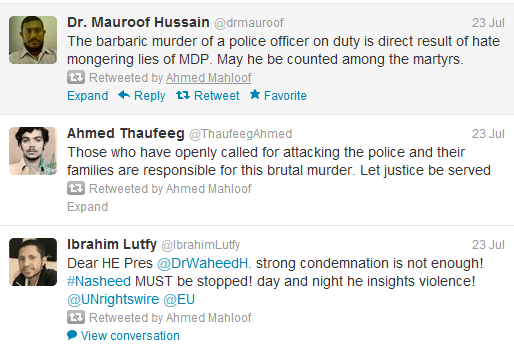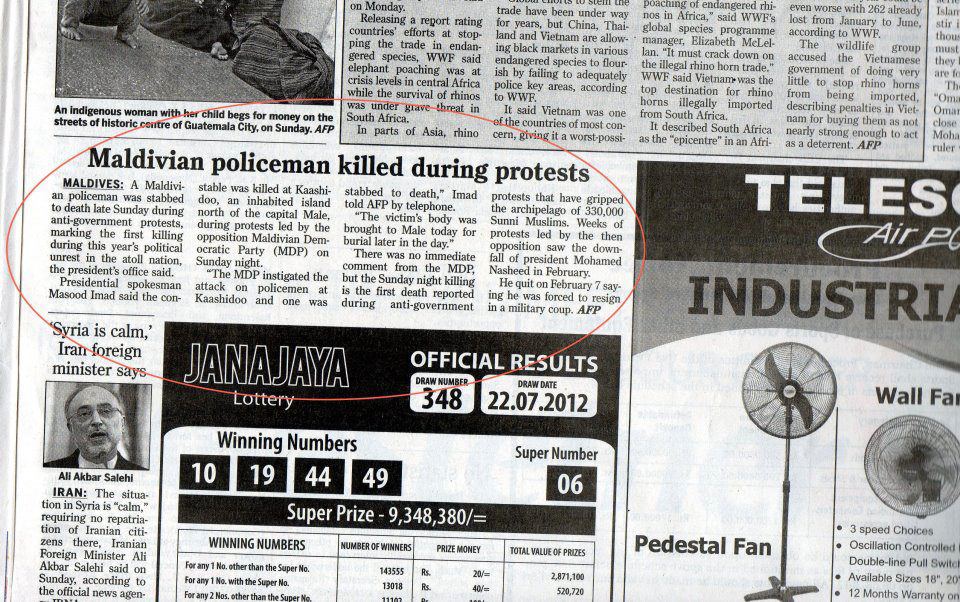The Maldives Police Service (MPS) has sent a letter to ousted President Mohamed Nasheed requesting he present himself at police headquarters on August 2 at 10:00am, regarding an investigation into a phone conversation police last week released to the media.
Police have claimed that in the phone conversation, tapped and recorded the day police dismantled the MDP protest camp ‘Usfasgandu’, Nasheed and former MDP Chairperson Mariya Didi discussed attacking police officers.
Police publicised the telephone conversation which they claimed was retrieved with a court order following information from intelligence.
Nasheed and Mariya’s leaked audio conversation appears to have been held during the police’s attempt to dismantle the MDP’s protest camp at Usfasgandu on May 29. Police had obtained a search warrant claiming MDP was performing black magic, conducting criminal activity and damaging public property in the area.
In the audio clip, Mariya says: “[Police] are forcing people back! They are using pepper spray! That is why we are unable to hold a national council meeting. And we have also received a second letter, ordering us to vacate the area by ten o’clock tonight. We cannot file an appeal at court or do anything. We cannot even hold the National Council meeting. We won’t have [enough members for] quorum. Shihab is here. But they are using pepper spray and forcing people back. Can only vacate the place if we could only get in there. This is all very unjust. What shall I do?”
Nasheed then replies, “There’s not much we can do. I don’t know. What is there to do? I think [we] need to get people out to fight if we can get them. If we can get people to fight, get them out. It’s very clear to me, I think we need to fight back. If we can get people to fight. Find kids from Male to fight the police,” Mariya laughs at this point, but Nasheed continues, “That is what I think. I don’t know if we can get people to fight. I want to fight against them.”
Superintendent of Police Abdulla Riyaz at the time said the police had decided to publicise the audio conversation “because we have no other choice.”
Riyaz said Mariya had been summoned for questioning over the audio clip on June 20, but claimed the MDP had spread “baseless allegations” that police were arresting and harassing opposition politicians for no apparent reason. “The time has come to reveal the truth,” Riyaz said.
The audio clip was obtained legally through a court warrant, he added.
Speaking to Minivan News, police media official Haneef confirmed that the letter was sent.
“The retrieved of the phone call was within the law. We can assure that,” he said.
Calls for arrest of Nasheed
Following the controversial transfer of power, several politicians and political parties supporting the current government of President Mohamed Waheed Hassan have openly called on the government to arrest Nasheed.
The latest call came on Saturday night during a rally held by former President Maumoon Abdul Gayoom’s Progressive Party of Maldives (PPM), where party council members openly vowed to arrest Nasheed and put him in “solitary confinement”.
During the rally Deputy Minister of Transport Ahmed Nazim highlighted the party’s efforts to topple Nasheed’s government, and praised the patience of those who took to streets to bring an end to Nasheed’s government.
“When we come out to do something, we won’t back down. We proved that when we came out to bring Nasheed down, and we only stopped after bringing an end to Nasheed’s dictatorship,” he said.
“Now we have come out to put an end to all this. I assure you all, we will only stop after putting Nasheed in solitary confinement,” Nazim said.
Speaking at the rally PPM MP Ahmed Nihan Hassan Manik also assured the party supporters that Nasheed would face trial and would be “imprisoned for a very long time”.
“I am saying this as the deputy chair of the parliament’s temporary committee set up to look into crimes that Nasheed has committed. I assure you we will thoroughly investigate what he has done in the last three years,” he said.
Last month, Interim vice Preisdent of PPM Umar Naseer expressed his confidence that the Prosecutor General’s (PG) investigation into charges against former President Mohamed Nasheed will see his imprisonment before the scheduled elections in July 2013.
“We will make sure that the Maldivian state does this. We will not let him go; the leader who unlawfully ordered the police and military to kidnap a judge and detain him for 22 days will be brought to justice,” he said at the time.
He further added that the PG had told him that Nasheed would be prosecuted.
“He is an independent person. I hope he will prosecute this case. He has said that he will. I have no doubt that he will,” Naseer said.
Pepper sprayed
On June 16, local TV station aired a video showing the police pepper-spraying Nasheed while he was participating in the MDP led protests calling for an end to police brutality and the holding of early elections.
The video shows a riot police officer reaching over a crowd of people surrounding Nasheed and spraying him in the face. Nasheed turns away as the spray hits him, and is taken away by his supporters, but later returned to the protest.
Police initially denied use of any excessive force or pepper spray on the protesters.
“Maldives Police did not use any excessive force nor was pepper spray directed to anyone’s face,” police said in a statement at the time.
“The Maldives Police strongly denies MDP allegations of directly pepper spraying on individuals eyes at close range, especially ex-president Mohamed Nasheed, and urge the Maldivian Democratic Party to publish statements responsibly,” police said.
Police admitted using the spray to control the crowd during their recovery of barricades removed by the demonstrators, but denied intentionally targeting the former President.
“Pepper spray was used to halt the charging demonstrators on July 14th night against police barricades set for security reasons. This spraying was never in any case directed to human eyes in close range but into the air to avert possible regulation violations by demonstrators,” the statement read.
“The allegations made by the Maldivian Democratic Party against Maldives Police pepper spraying directly on Ex-president Nasheed’s face are not true. The Maldives Police Service have no intentions on directly pepper spraying on Ex-President Mohamed Nasheed nor any other individuals; however, the incident is currently being looked into and necessary actions will be taken against any officer who uses excessive force.”
However to the surprise of many, police later told the media that Nasheed’s body guards did not see him being pepper sprayed to an inquiry.
Police questioned the Maldives National Defence Force (MNDF) Special Protection Group (SPG) bodyguards assigned to Nasheed, after the media publicised video footage of a police officer pepper spraying Nasheed’s face while he was with a group of MDP supporters at a protest.
In a statement issued on following the allegations, police said that Nasheed’s bodyguards said that while they were aware pepper spray was being used in the area, they could not identify the officer using it.
Police said officers that working that night to control the protest were also questioned, and said they had used pepper spray after protesters moved inside the cordoned area and refused to move back after police advised the protesters to do so.
Police said they did not spray at any individual, and that the pepper spray was targeted at the crowed, the police statement said.
Charges
On July 15, PG Ahmed Muizz has filed charges against Nasheed and the former defense minister Tholhath Ibrahim Kaleyfaanu for their alleged role in detaining Criminal Court Chief Justice Abdulla Mohamed in January.
Nasheed and Tholhath were charged with violating Article 81 of the Penal Code, which states that the detention of a government employee who has not been found guilty of a crime is illegal. If found guilty, Nasheed and Tholhath will face a jail sentence or banishment for three years or a Rf 3000 fine (US$193.5).
The case, if lost may bar Nasheed from any upcoming presidential elections was filed in Hulhumale Magistrate Court instead of Criminal Court, where PG stated that the decision was because there was a conflict of interest.
However, Hulhumale Court rejected the case on July 18 stating that it did not have the jurisdiction to preside on the case.
Hulhumale’ Court Magistrate Moosa Naseem told Minivan News at the time that the case was sent back to the Prosecutor General’s Office after the court stated it did not have the jurisdiction to deal with such cases under the Judicature Act.
‘’We studied the case and we found that we do not have the jurisdiction to deal with the case according to article 66 of the Judicature Act,’’ Naseem said.
Naseem told local media that the Hulhumale’-based court can only accept the case after the Chief Justice issues a decree in agreement with the Judicial Service Commission (JSC) and the Judicial Council as stated in the article 66[b] of the Judicature Act.
Following the decision, PG asked the court to review its decision.
Deputy PG Hussein Shameem following the decision said that Hulhumale’ Magistrate Court does have the jurisdiction to hear the case of former President Mohamed Nasheed over his role in the detention of a Criminal Court Chief Judge.
Shameem contended that should the court maintain its decision against hearing the case, there were few other judicial alternatives in trying to ensure a “fair trial”.



